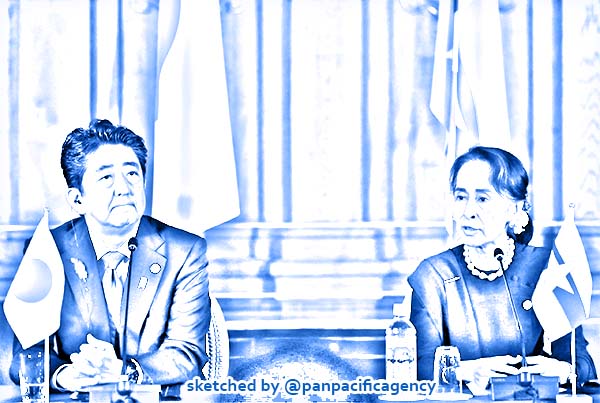Japan refuses to issue visas for military-backed Myanmar diplomats

Myanmar's State Counsellor Aung San Suu Kyi (right) delivers a speech next to Japan's Prime Minister Shinzo Abe in Tokyo in 2018. Photo: Franck Robichon/Pool/AFP. Sketched by the Pan Pacific Agency.
TOKYO, Aug 22, 2021, Kyodo. Japan has effectively refused to issue visas for two Myanmar military-appointed diplomats the junta seeks to send to Tokyo in place of two it fired in March, according to Japanese government sources, Kyodo News Agency reported.
Japan allowing the two replacements to be posted to the Myanmar Embassy in Tokyo would be tantamount to recognizing the Feb. 1 military coup that ousted the country’s elected government under civilian leader Aung San Suu Kyi.
Myanmar’s military has requested that Japan issue diplomatic visas for the two replacements. Japan has said it “is considering” the request but has yet to start issuance procedures, the sources said.
In the meantime, Japan is continuing to recognize the diplomatic status of the two sacked diplomats after the pair boycotted their duties at the embassy in protest of the coup.
Japan does not recognize the military, known as Tatmadaw, as a legitimate governing body of Myanmar.
According to a document dated March 15, the Myanmar Embassy told the Japanese Foreign Ministry its military-backed government nullified the two’s diplomatic status and passports.
The embassy requested that Japan not allow them to use their passports, the documents show.
However, Japan has allowed the two to stay in Japan. “We have made arrangements so the two can continue to work as diplomats,” a Foreign Ministry source said, even though a Japan-issued diplomatic identification card of one of the two expired in July.
The two have been collaborating with the National Unity Government of Myanmar, a group formed in the wake of the coup to represent the pro-democracy movement in its fight against the junta.
Some Japanese officials said the government needs to closely monitor the case of Myanmar’s U.N. ambassador before drawing a final decision as to how Tokyo will handle the Myanmar military’s request for issuance of visas for military-appointed diplomats.
Given that the military has demanded the nation’s pre-coup U.N Ambassador Kyaw Moe Tun be replaced by a military-appointed official, member states will eventually have to decide who will be recognized in the position.
Kyaw Moe Tun remains in the United States after being charged with treason for expressing opposition to the coup at an unofficial meeting of the U.N. General Assembly on Feb. 26.
Earlier in the month, Japanese Foreign Minister Toshimitsu Motegi expressed full support for the Association of Southeast Asian Nations’ decision to appoint a special envoy to Myanmar in the group’s bid to resolve the crisis.
ASEAN and Japan, among other countries, have been calling for the immediate release of Suu Kyi, other members of the former ruling party, the National League for Democracy, as well as other detainees.
Still, Tokyo remains cautious about joining the United States, Britain and the European Union among other democracies in imposing sanctions on individuals and groups involved in the coup, partly because of Japan’s close economic ties with Myanmar and China’s rising influence on Myanmar and other ASEAN member states.